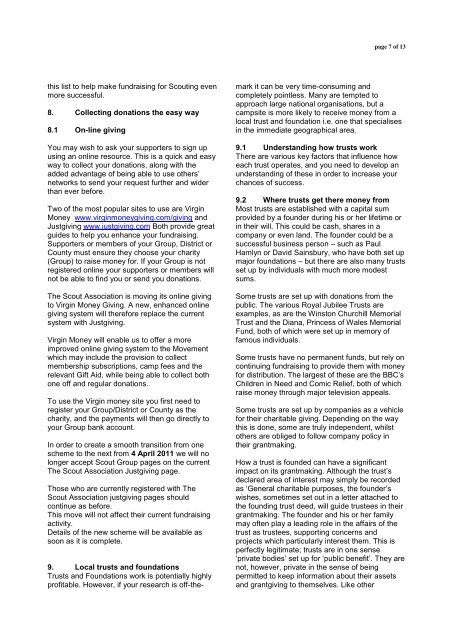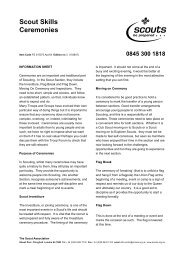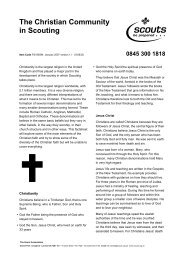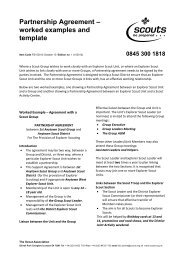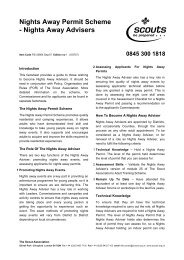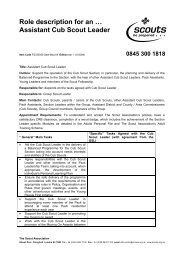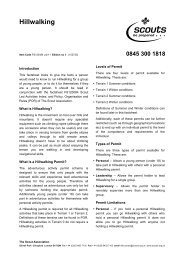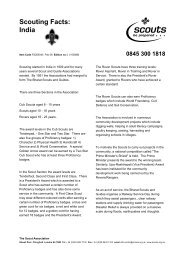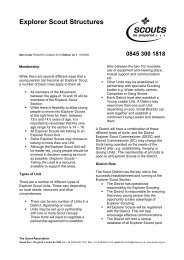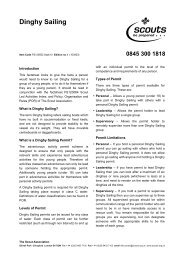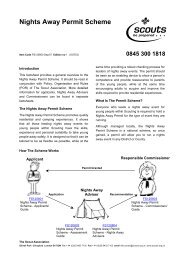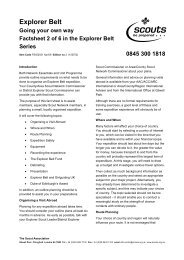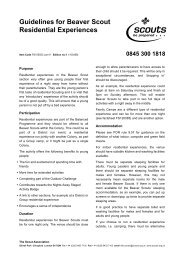Fundraising for Local Scouting - ScoutBase UK
Fundraising for Local Scouting - ScoutBase UK
Fundraising for Local Scouting - ScoutBase UK
Create successful ePaper yourself
Turn your PDF publications into a flip-book with our unique Google optimized e-Paper software.
page 7 of 13this list to help make fundraising <strong>for</strong> <strong>Scouting</strong> evenmore successful.8. Collecting donations the easy way8.1 On-line givingYou may wish to ask your supporters to sign upusing an online resource. This is a quick and easyway to collect your donations, along with theadded advantage of being able to use others’networks to send your request further and widerthan ever be<strong>for</strong>e.Two of the most popular sites to use are VirginMoney www.virginmoneygiving.com/giving andJustgiving www.justgiving.com Both provide greatguides to help you enhance your fundraising.Supporters or members of your Group, District orCounty must ensure they choose your charity(Group) to raise money <strong>for</strong>. If your Group is notregistered online your supporters or members willnot be able to find you or send you donations.The Scout Association is moving its online givingto Virgin Money Giving. A new, enhanced onlinegiving system will there<strong>for</strong>e replace the currentsystem with Justgiving.Virgin Money will enable us to offer a moreimproved online giving system to the Movementwhich may include the provision to collectmembership subscriptions, camp fees and therelevant Gift Aid, while being able to collect bothone off and regular donations.To use the Virgin money site you first need toregister your Group/District or County as thecharity, and the payments will then go directly toyour Group bank account.In order to create a smooth transition from onescheme to the next from 4 April 2011 we will nolonger accept Scout Group pages on the currentThe Scout Association Justgiving page.Those who are currently registered with TheScout Association justgiving pages shouldcontinue as be<strong>for</strong>e.This move will not affect their current fundraisingactivity.Details of the new scheme will be available assoon as it is complete.9. <strong>Local</strong> trusts and foundationsTrusts and Foundations work is potentially highlyprofitable. However, if your research is off-themarkit can be very time-consuming andcompletely pointless. Many are tempted toapproach large national organisations, but acampsite is more likely to receive money from alocal trust and foundation i.e. one that specialisesin the immediate geographical area.9.1 Understanding how trusts workThere are various key factors that influence howeach trust operates, and you need to develop anunderstanding of these in order to increase yourchances of success.9.2 Where trusts get there money fromMost trusts are established with a capital sumprovided by a founder during his or her lifetime orin their will. This could be cash, shares in acompany or even land. The founder could be asuccessful business person – such as PaulHamlyn or David Sainsbury, who have both set upmajor foundations – but there are also many trustsset up by individuals with much more modestsums.Some trusts are set up with donations from thepublic. The various Royal Jubilee Trusts areexamples, as are the Winston Churchill MemorialTrust and the Diana, Princess of Wales MemorialFund, both of which were set up in memory offamous individuals.Some trusts have no permanent funds, but rely oncontinuing fundraising to provide them with money<strong>for</strong> distribution. The largest of these are the BBC’sChildren in Need and Comic Relief, both of whichraise money through major television appeals.Some trusts are set up by companies as a vehicle<strong>for</strong> their charitable giving. Depending on the waythis is done, some are truly independent, whilstothers are obliged to follow company policy intheir grantmaking.How a trust is founded can have a significantimpact on its grantmaking. Although the trust’sdeclared area of interest may simply be recordedas ‘General charitable purposes, the founder’swishes, sometimes set out in a letter attached tothe founding trust deed, will guide trustees in theirgrantmaking. The founder and his or her familymay often play a leading role in the affairs of thetrust as trustees, supporting concerns andprojects which particularly interest them. This isperfectly legitimate; trusts are in one sense‘private bodies’ set up <strong>for</strong> ‘public benefit’. They arenot, however, private in the sense of beingpermitted to keep in<strong>for</strong>mation about their assetsand grantgiving to themselves. Like other


